选修六Module 4 Music Introduction & Reading and Vocabulary(共37张PPT)
文档属性
| 名称 | 选修六Module 4 Music Introduction & Reading and Vocabulary(共37张PPT) |
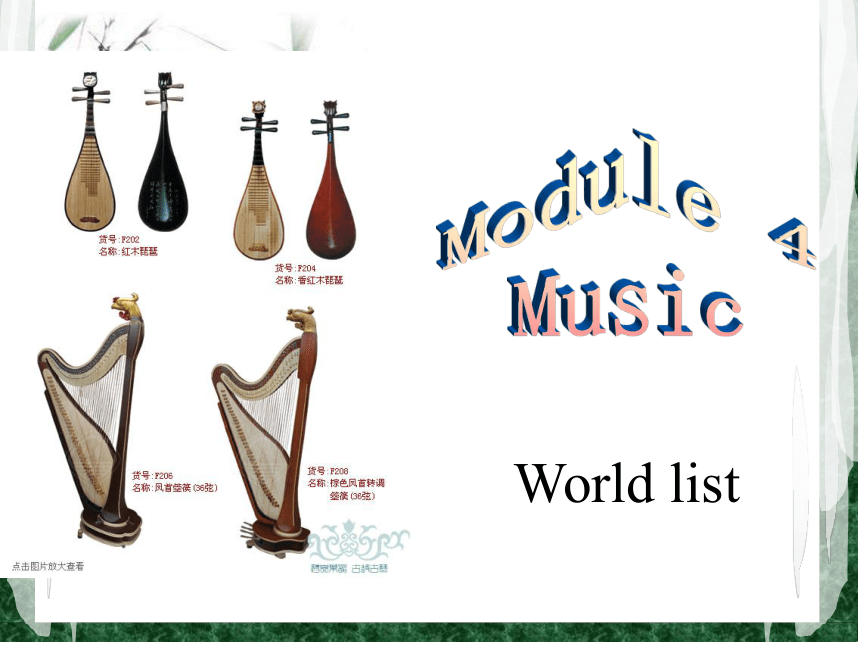
|
|
| 格式 | zip | ||
| 文件大小 | 1.3MB | ||
| 资源类型 | 教案 | ||
| 版本资源 | 外研版 | ||
| 科目 | 英语 | ||
| 更新时间 | 2018-11-23 08:00:22 | ||
图片预览

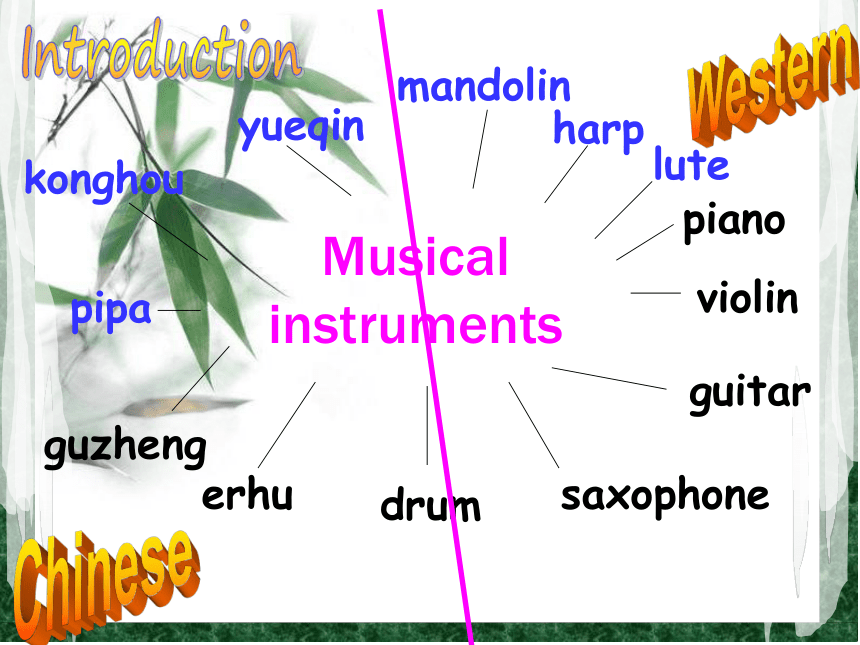
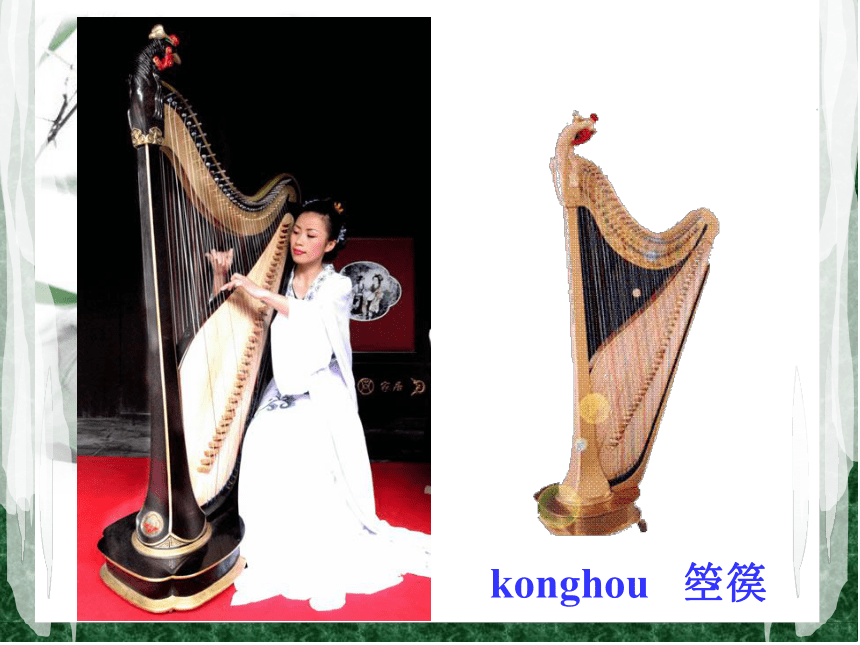
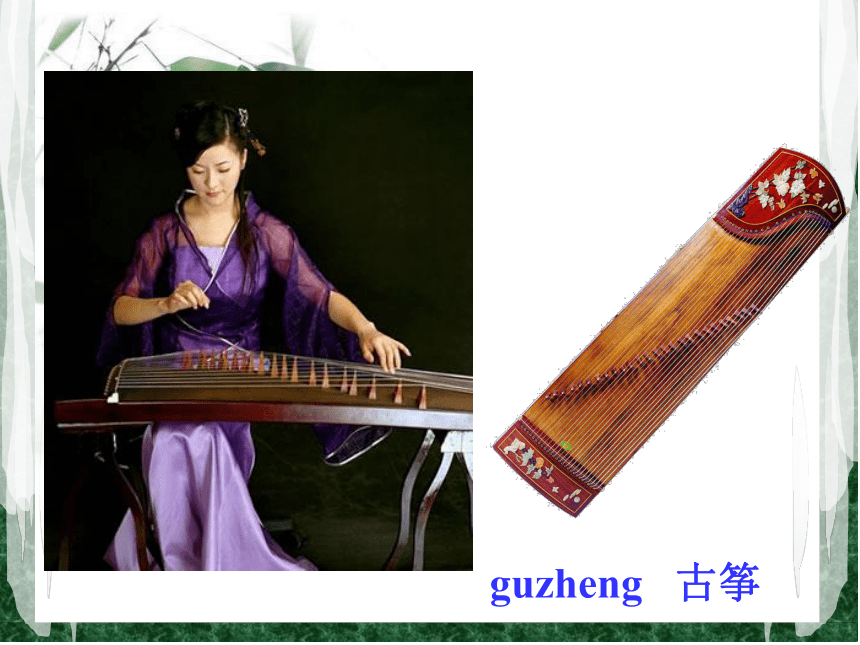
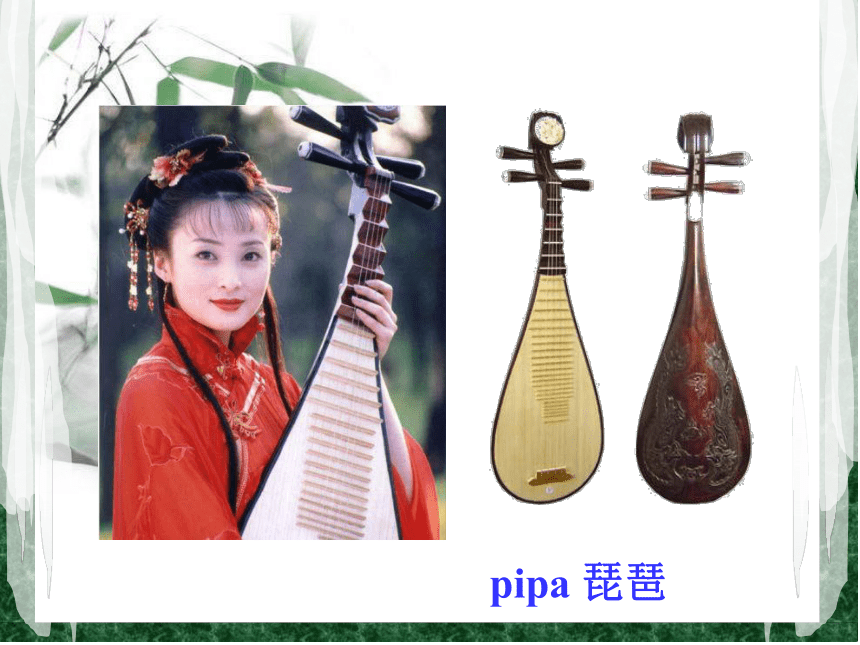
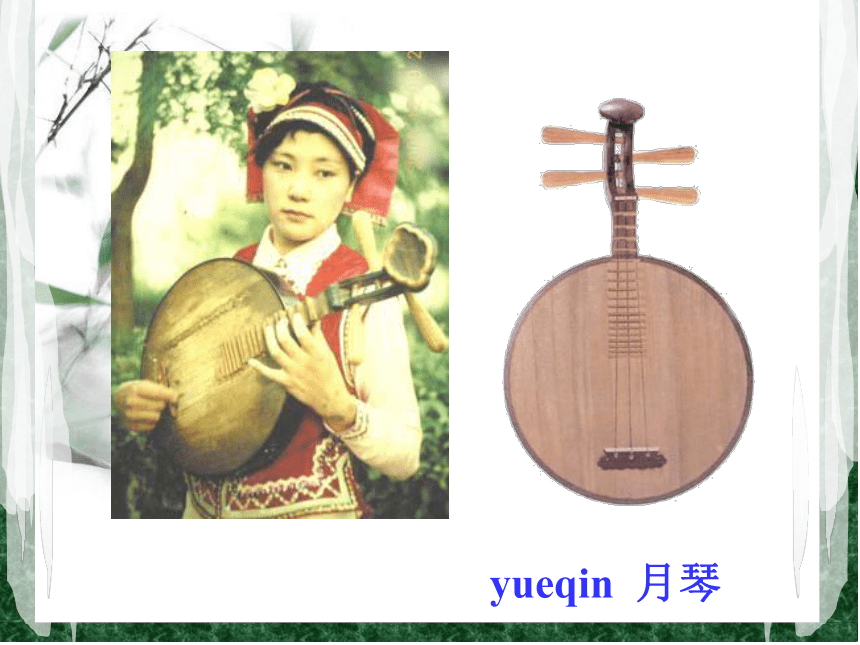
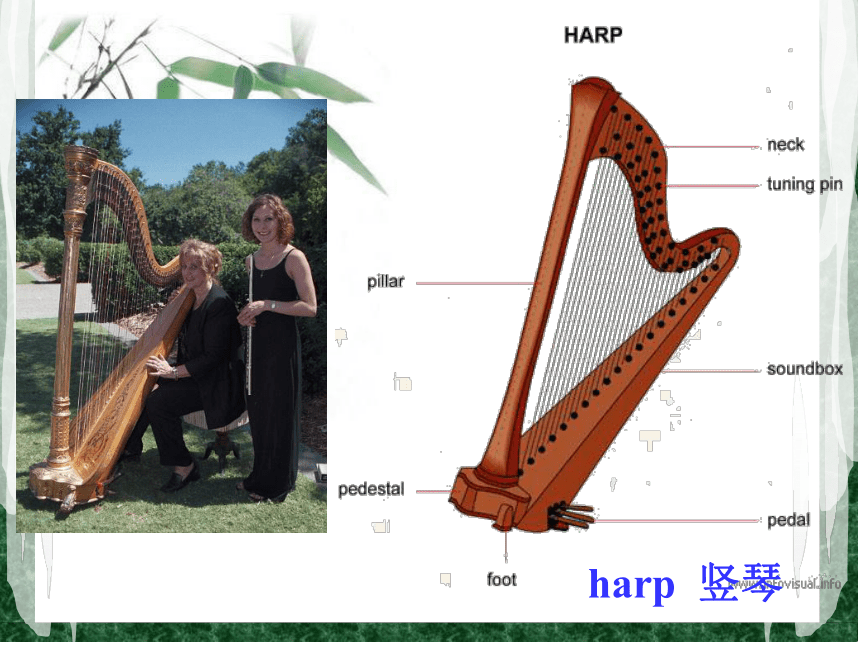
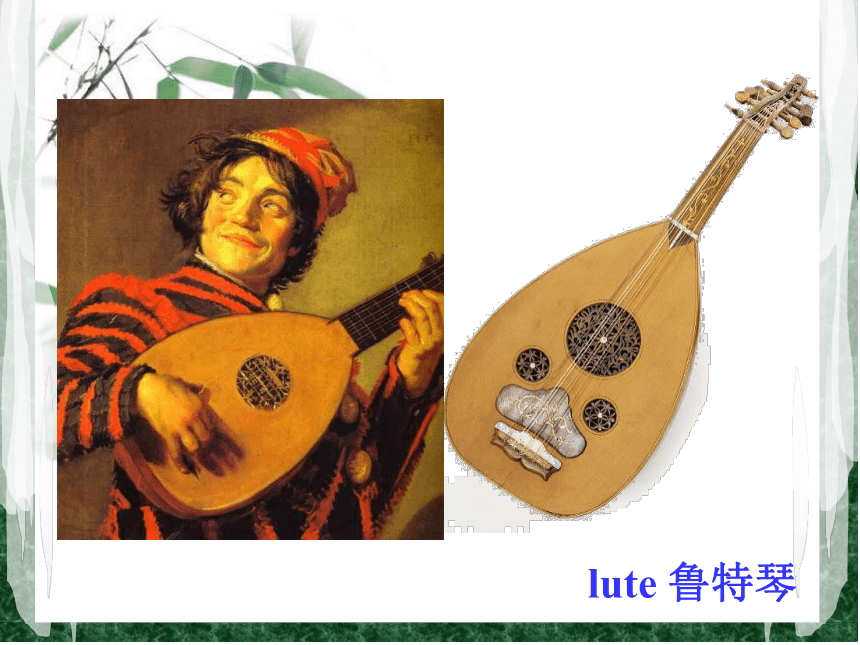
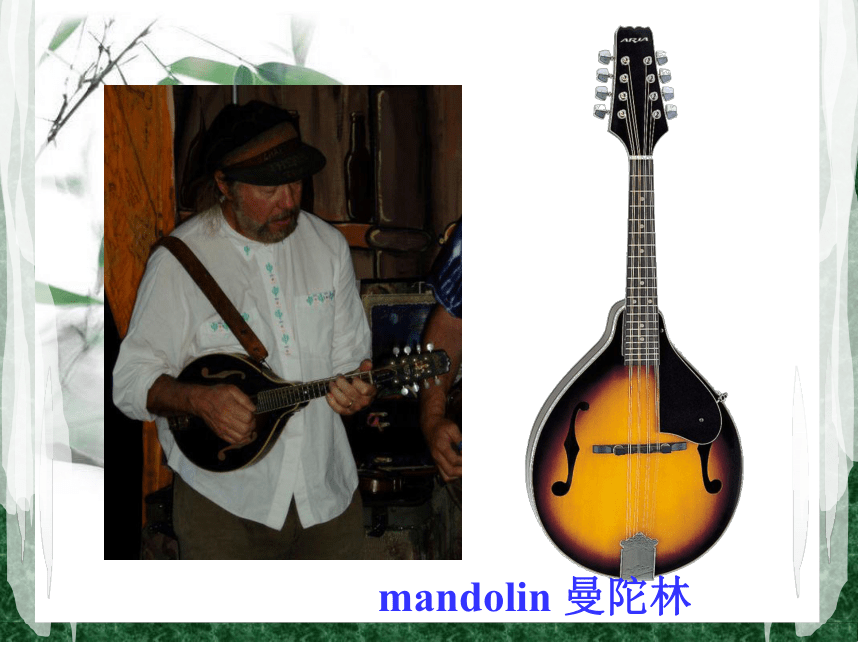
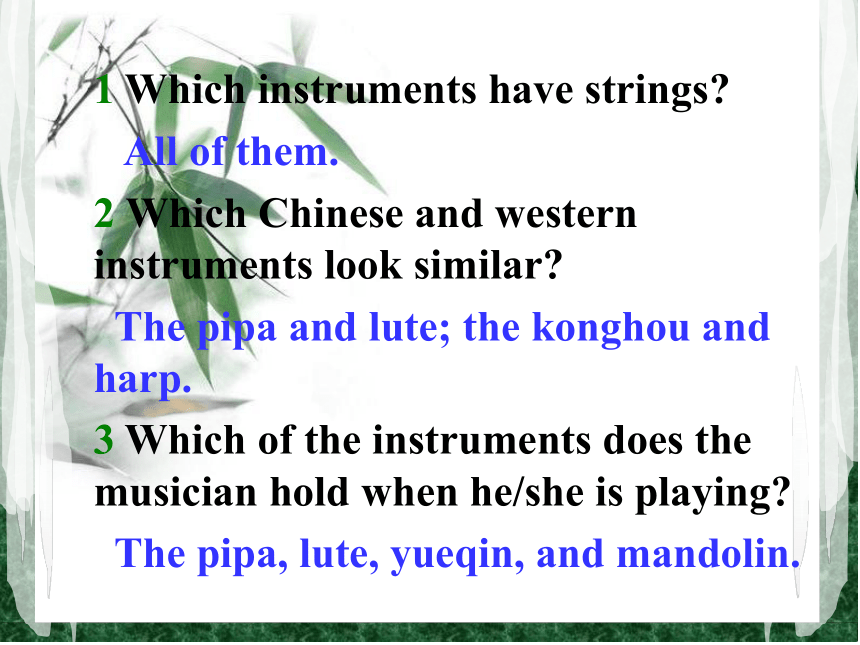
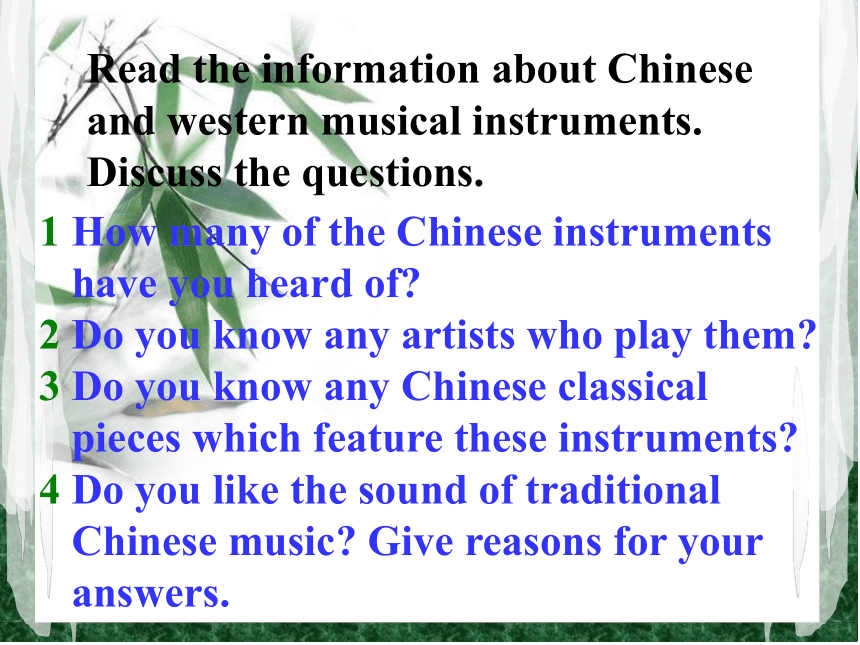

文档简介
课件37张PPT。Module 4
MusicWorld listMusical
instrumentsChineseWesternIntroductionkonghou 箜篌guzheng 古筝pipa 琵琶yueqin 月琴harp 竖琴lute 鲁特琴mandolin 曼陀林1 Which instruments have strings?
All of them.
2 Which Chinese and western instruments look similar?
The pipa and lute; the konghou and harp.
3 Which of the instruments does the musician hold when he/she is playing?
The pipa, lute, yueqin, and mandolin.1Read the information about Chinese and western musical instruments. Discuss the questions.21 How many of the Chinese instruments
have you heard of?
2 Do you know any artists who play them?
3 Do you know any Chinese classical
pieces which feature these instruments?
4 Do you like the sound of traditional
Chinese music? Give reasons for your
answers.Reading and VocabularyAn Interview with Liu FangWords Previewgive concerts
conservatory
soloist
repertoire
interpret
(be) true of/for
folk song举办音乐会
n.音乐学院
n.独奏者,独唱者
n.演奏曲目
v.解释,翻译
与……情况相同
民歌characteristic
poetry
poetic
give life to
(be) the same with
combine
depressn.特征,特性
n.诗歌
adj.有诗意的
赋予……生命
与……情况相同
v.结合,联合
v.使沮丧Words Previewshare feelings and ideas with
make contact with
master musician
compose music
ambition
regarding
melody与……分享感受与想法
与……进行来往
音乐大师
创作乐曲
n.志气,抱负
prep.关于
n.旋律Words PreviewWatch and guess:who is she?Suppose you have an interview with her. What questions will you ask?
And then write them down. Pre-readingReadinginternational music star1974KunmingCanadaShanghai Conservatory of Musicpipa and guzhengher motherpipa and guzhengPart 1
Part 2
Part 3introduces Liu Fang as well as her musical training and background
tells about Liu Fang’s musical influences and characteristics of Chinese classical music
is about Liu Fang’s love for performing live and her goals as an artist.Careful Reading1 a musician who performs alone
2 a way of doing something, for example, playing an instrument
3 another word for melody
4 an event where musicians play
5 all the pieces of music that a musician can play
6 a school where musicians studysoloisttechniquetune concertrepertoireconservatoryVocabularyPost-reading11…during her visit to China. Who visited China?
2 … she taught me to play the yueqin. Who taught her to play?
3 I have been living there since then. Where has she been living?Her mother.The Queen of England.Canada.Pipa school.To respect traditions but add her own style when playing.4 …each one has its special way of interpreting the classical pieces. Each what?
5 The same is true of my second instrument. What is true about the second instrument?21 Traditional singing is ____.
(a) the most important influence on Liu Fang’s style
(b) not such an important influence.
2 When people listen to her playing, ___.
(a) they also hear her singing
(b) they think they can hear singing
3 Liu Fang thinks that ____.
(a) Chinese music is like the Chinese language
(b) Chinese music and language use the same tones4 Chinese classical pieces often have poetic titles, ___.
(a) which is understandable
(b) which is very surprising
5 Empty spaces in Chinese paintings ___.
(a) are like the silent parts of Chinese music
(b) mean the pictures have no life1 What does Liu Fang enjoy about performing?
2 What makes her feel depressed or lonely?
3 What does she want to do with other musicians?The atmosphere in a concert hall.When she has no concert for a long time.Work with them.34 What is her ambition regarding Chinese music?She wants to compose her own music and introduce classical pipa, guzheng music everywhere.challenge combine interpret silence title traditional4Read the words and complete the sentences with the correct form of them.1 She likes to _______ musical styles from east and west.
2 What is the ____ of the piece she played?
3 I like listening to _________ Chinese folk songs.
4 It’s a great ________ to play an instrument like the pipa.
5 Sometimes there is a long ______ in the middle of the piece.
6 I like the way she _________ classical pieces.combinetitletraditionalchallengesilenceinterpretsShe was born in 1974 and has played the pipa since the age of six.
She’s given concerts since she was eleven, including a performance for the Queen of England during her visit to China.
She graduated from the Shanghai Conservatory of Music, where she also studied the guzheng in 1993.
4. The same is true of my second instrument, the guzheng.Useful sentences5. Secondly, classical Chinese music is closely connected to Chinese poetry, so it isn’t surprising that most classical pieces have very poetic titles.
They give life to the whole painting and they allow people to come into the picture, like a dialogue.
7. It’s the same with classical Chinese music.
I enjoy playing and I enjoy performing in public.9. Since I moved to Canada, I have had opportunities to make contact with other musical traditions and play with master musicians.Who is Liu Fang?现居加拿大蒙特利尔市(Montreal)的刘芳1974年生于云南昆明,六岁开始学习琵琶,师从琵琶演奏家、 作曲家曾庆蓉女士。九岁时首次公演,并开始在各种青少年琵琶比赛中不断获奖,被喻为 “鲜花和掌声中长大”。同时也多次参加同各种文艺团体合作的演出活动,1985年, 英国女王伊丽莎白访问中国时,十一岁的刘芳曾为女王陛下演奏琵琶。Material"简直无法用语言来形容刘芳在巴黎的琵琶古筝独奏音乐——那是对于关注艺术并且博学的上层公众在听觉、视觉和心灵上的一场真正盛宴。对于如此出色的演奏家来讲,她能让人遗忘高难度的技巧障碍,把听众轻松而宁静地带入美妙的音乐天堂。刘芳高超的演技同她的音乐理念结合,用手指,用整个身心,用优雅的姿态演奏中国音乐中的大师作品,将自己完全融入音乐之中。” Tran Van Khe 博士,音乐学家,教科文国际音乐理事会荣誉会员。“刘芳作为年轻而富有天才的中国传统音乐演绎者, 她在琵琶和古筝方面的高超造诣为她树立了国际声誉。 她期望将自己有关东方传统的知识和实践与西方古典音乐、现代音乐、即兴创作相结合, 创造崭新的音乐形式,联结不同的文化,发掘新的听众。” "Liu Fang's mastery of the pipa and the guzheng has established her international reputation as a highly talented young interpreter of traditional Chinese music. She aspires to combine her knowledge and practice of Eastern traditions with western classical music, contemporary music and improvisation, thereby creating new musical forms, uniting different cultures and discovering new audiences."Thank you!
MusicWorld listMusical
instrumentsChineseWesternIntroductionkonghou 箜篌guzheng 古筝pipa 琵琶yueqin 月琴harp 竖琴lute 鲁特琴mandolin 曼陀林1 Which instruments have strings?
All of them.
2 Which Chinese and western instruments look similar?
The pipa and lute; the konghou and harp.
3 Which of the instruments does the musician hold when he/she is playing?
The pipa, lute, yueqin, and mandolin.1Read the information about Chinese and western musical instruments. Discuss the questions.21 How many of the Chinese instruments
have you heard of?
2 Do you know any artists who play them?
3 Do you know any Chinese classical
pieces which feature these instruments?
4 Do you like the sound of traditional
Chinese music? Give reasons for your
answers.Reading and VocabularyAn Interview with Liu FangWords Previewgive concerts
conservatory
soloist
repertoire
interpret
(be) true of/for
folk song举办音乐会
n.音乐学院
n.独奏者,独唱者
n.演奏曲目
v.解释,翻译
与……情况相同
民歌characteristic
poetry
poetic
give life to
(be) the same with
combine
depressn.特征,特性
n.诗歌
adj.有诗意的
赋予……生命
与……情况相同
v.结合,联合
v.使沮丧Words Previewshare feelings and ideas with
make contact with
master musician
compose music
ambition
regarding
melody与……分享感受与想法
与……进行来往
音乐大师
创作乐曲
n.志气,抱负
prep.关于
n.旋律Words PreviewWatch and guess:who is she?Suppose you have an interview with her. What questions will you ask?
And then write them down. Pre-readingReadinginternational music star1974KunmingCanadaShanghai Conservatory of Musicpipa and guzhengher motherpipa and guzhengPart 1
Part 2
Part 3introduces Liu Fang as well as her musical training and background
tells about Liu Fang’s musical influences and characteristics of Chinese classical music
is about Liu Fang’s love for performing live and her goals as an artist.Careful Reading1 a musician who performs alone
2 a way of doing something, for example, playing an instrument
3 another word for melody
4 an event where musicians play
5 all the pieces of music that a musician can play
6 a school where musicians studysoloisttechniquetune concertrepertoireconservatoryVocabularyPost-reading11…during her visit to China. Who visited China?
2 … she taught me to play the yueqin. Who taught her to play?
3 I have been living there since then. Where has she been living?Her mother.The Queen of England.Canada.Pipa school.To respect traditions but add her own style when playing.4 …each one has its special way of interpreting the classical pieces. Each what?
5 The same is true of my second instrument. What is true about the second instrument?21 Traditional singing is ____.
(a) the most important influence on Liu Fang’s style
(b) not such an important influence.
2 When people listen to her playing, ___.
(a) they also hear her singing
(b) they think they can hear singing
3 Liu Fang thinks that ____.
(a) Chinese music is like the Chinese language
(b) Chinese music and language use the same tones4 Chinese classical pieces often have poetic titles, ___.
(a) which is understandable
(b) which is very surprising
5 Empty spaces in Chinese paintings ___.
(a) are like the silent parts of Chinese music
(b) mean the pictures have no life1 What does Liu Fang enjoy about performing?
2 What makes her feel depressed or lonely?
3 What does she want to do with other musicians?The atmosphere in a concert hall.When she has no concert for a long time.Work with them.34 What is her ambition regarding Chinese music?She wants to compose her own music and introduce classical pipa, guzheng music everywhere.challenge combine interpret silence title traditional4Read the words and complete the sentences with the correct form of them.1 She likes to _______ musical styles from east and west.
2 What is the ____ of the piece she played?
3 I like listening to _________ Chinese folk songs.
4 It’s a great ________ to play an instrument like the pipa.
5 Sometimes there is a long ______ in the middle of the piece.
6 I like the way she _________ classical pieces.combinetitletraditionalchallengesilenceinterpretsShe was born in 1974 and has played the pipa since the age of six.
She’s given concerts since she was eleven, including a performance for the Queen of England during her visit to China.
She graduated from the Shanghai Conservatory of Music, where she also studied the guzheng in 1993.
4. The same is true of my second instrument, the guzheng.Useful sentences5. Secondly, classical Chinese music is closely connected to Chinese poetry, so it isn’t surprising that most classical pieces have very poetic titles.
They give life to the whole painting and they allow people to come into the picture, like a dialogue.
7. It’s the same with classical Chinese music.
I enjoy playing and I enjoy performing in public.9. Since I moved to Canada, I have had opportunities to make contact with other musical traditions and play with master musicians.Who is Liu Fang?现居加拿大蒙特利尔市(Montreal)的刘芳1974年生于云南昆明,六岁开始学习琵琶,师从琵琶演奏家、 作曲家曾庆蓉女士。九岁时首次公演,并开始在各种青少年琵琶比赛中不断获奖,被喻为 “鲜花和掌声中长大”。同时也多次参加同各种文艺团体合作的演出活动,1985年, 英国女王伊丽莎白访问中国时,十一岁的刘芳曾为女王陛下演奏琵琶。Material"简直无法用语言来形容刘芳在巴黎的琵琶古筝独奏音乐——那是对于关注艺术并且博学的上层公众在听觉、视觉和心灵上的一场真正盛宴。对于如此出色的演奏家来讲,她能让人遗忘高难度的技巧障碍,把听众轻松而宁静地带入美妙的音乐天堂。刘芳高超的演技同她的音乐理念结合,用手指,用整个身心,用优雅的姿态演奏中国音乐中的大师作品,将自己完全融入音乐之中。” Tran Van Khe 博士,音乐学家,教科文国际音乐理事会荣誉会员。“刘芳作为年轻而富有天才的中国传统音乐演绎者, 她在琵琶和古筝方面的高超造诣为她树立了国际声誉。 她期望将自己有关东方传统的知识和实践与西方古典音乐、现代音乐、即兴创作相结合, 创造崭新的音乐形式,联结不同的文化,发掘新的听众。” "Liu Fang's mastery of the pipa and the guzheng has established her international reputation as a highly talented young interpreter of traditional Chinese music. She aspires to combine her knowledge and practice of Eastern traditions with western classical music, contemporary music and improvisation, thereby creating new musical forms, uniting different cultures and discovering new audiences."Thank you!
